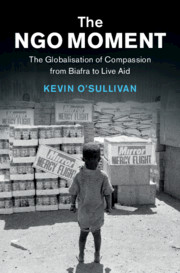7 - The Turn to Human Rights
from Part IV: - A People’s Compassion
Published online by Cambridge University Press: 01 October 2021
Summary
This chapter traces the global NGO sector’s late twentieth-century turn to human rights to the brutal civil conflict in El Salvador in the 1980s. It examines the moral and political debates that accompanied the spread of rights-based activism in that decade and how they conditioned contemporaneous understandings of ‘aid’. This case study provides us with an important insight into the complex set of influences that shaped the concept of global compassion. NGOs adopted human rights language – and particularly the non-political politicking on which it was built – as a method for critiquing the existing world order. But the rise of rights-based humanitarianism was also conditioned from the Third World. Activists from El Salvador, for example, played a key role in influencing the intellectual and ideological frameworks through which NGOs understood the conflict. This was a striking reframing of ‘people-to-people’ action. Yet despite that disruption, the chapter concludes, the turn to human rights was ultimately built less on solidarity with the revolutionaries’ aims (though such sentiments were present, particularly among aid workers in the region) and more on an essentialising view of humanity that could appeal to a wide array of donors.
- Type
- Chapter
- Information
- The NGO MomentThe Globalisation of Compassion from Biafra to Live Aid, pp. 137 - 155Publisher: Cambridge University PressPrint publication year: 2021
- 1
- Cited by

